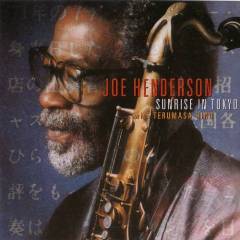Joe Henderson – Sunrise In Tokyo (1971)
Joe Henderson - Sunrise in Tokyo (1971)

1. Sunrise In Tokyo 2. So What 3. Get Magic Again Musicians: Joe Henderson - tenor saxophone Terumasa Hino - trumpet Kousuke Mine - alto and soprano saxophones Masabumi Kikuchi - piano, electric piano Yoshio Suzuki - bass Hiroshi Murakami, Yoshiyuki Nakamura – drums "Tokyo Toshi Center Hall" Tokyo, Japan August 5, 1971
The 1970s through into the early 1980s were a pretty bleak time for acoustic jazz, to the extent that many musicians were obliged to explore other directions - such as fusion - or leave the field entirely. One of the few places where interest remained high was, of course, Japan, and surprisingly many of the acoustic recordings from this period (both live and studio) were either recorded in Japan or produced for the Japanese market. In the case of Herbie Hancock, for example - to cite the case of but one artist - `The Piano', `Trio '77', the V.S.O.P. recordings, `Quartet', and so on and so forth.
`Sunrise in Tokyo' makes an interesting companion piece to the better known `Joe Henderson in Japan'. The latter was recorded on August 4th 1971, and involves a quartet in a club setting. `Sunrise' was recorded the following night in a concert hall environment and involves a different line-up playing different material; only Henderson himself is common to both. He is supported, in both cases, by top Japanese artists. On `Sunrise' these include Terumasa Hino (trumpet), Kosuke Mine (alto and soprano saxes), Masabumi Kikuchi (piano and e-piano), Yoshio Suzuki (bass), and Hiroshi Murakami and Yoshiyuki Nakamura (drums). Hino and Kikuchi are widely known on the international scene, the others rather less so.
There are just three tracks - `Sunrise in Tokyo' (by Henderson himself), `So What' (by Miles Davis), and `Get Magic Again' (by Kikuchi). The playing, both comping and soloing, is crisp and up to the moment throughout. Mine, for those who have never heard him, is sounding and playing very like Cannonball Adderley here. This in itself adds a note of interest - I have never heard Cannonball playing `So What' at such a fast tempo, and here Mine gives us a glimpse of how he might well have done so (!). Hino is dependably brilliant, Kikuchi in a more reflective mood. The rhythm section as a whole provide terrific pace and texture from beginning to end.
It is in the final track, however, that the Japanese artists really come into their own. From the very moment of his entry, for example, Hino's playing is utterly distinctive - much more so than in the preceding two pieces. Perhaps they were more familiar with the material; perhaps it's more representative of where they were coming from and where they were at, so to speak, back in those days. As composition goes, `Get Magic Again' is fairly loose and open-ended, providing both soloists and part players with considerable freedom to stretch their muscles and explore the various directions it opens up.
Henderson himself plays magnificently (as ever), and his leadership is characterised by a certain generosity toward his sidemen, giving them as he does ample opportunity to showcase their talents both as soloists and, in the case of Kikuchi, as composer.
The albums that Joe Henderson recorded for Blue Note back in the '60s were produced at a time when Jazz was arguably at its most creative. Each one brims with the qualities that have come to define Jazz - the technical brilliance, the seemingly effortless invention, the sense that new ground is being covered with each and every session etc. - and remains fresh and exhilarating even after repeated listening. For many, these are the substantial achievements that define what the man was and what he did.
`Sunrise in Tokyo', which was made just a few years later, when Henderson was still only thirty-four, is something much more fragile and transitory - a snapshot of a jobbing musician on the road during much more uncertain times. I can find little evidence to suggest that he played with these particular musicians on a regular basis, let alone that they constituted a working band. Even if they did, it seems highly likely that this is their sole recorded legacy. And, I have to say, the music they made on this particular evening is just pure pleasure. --- Giles Morgan, amazon.com
Last Updated (Tuesday, 09 December 2014 14:57)








